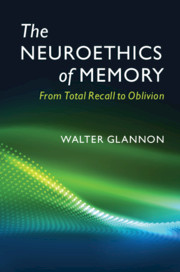Book contents
- The Neuroethics of Memory
- The Neuroethics of Memory
- Copyright page
- Dedication
- Contents
- Figures
- Acknowledgments
- Introduction
- 1 Memory Systems and Memory Stages
- 2 Agency, Identity and Dementia
- 3 Anesthesia, Amnesia and Recall
- 4 Disorders of Memory Content and Interventions
- 5 Disorders of Memory Capacity and Interventions
- 6 Legal Issues Involving Memory
- Epilogue
- References
- Index
6 - Legal Issues Involving Memory
Published online by Cambridge University Press: 18 July 2019
- The Neuroethics of Memory
- The Neuroethics of Memory
- Copyright page
- Dedication
- Contents
- Figures
- Acknowledgments
- Introduction
- 1 Memory Systems and Memory Stages
- 2 Agency, Identity and Dementia
- 3 Anesthesia, Amnesia and Recall
- 4 Disorders of Memory Content and Interventions
- 5 Disorders of Memory Capacity and Interventions
- 6 Legal Issues Involving Memory
- Epilogue
- References
- Index
Summary
This chapter argues that one can have some memory loss over time but remain the same person and be held responsible for one’s earlier actions. Amnesia following an action does not entail that the agent had no cognitive or volitional control when he acted. Amnesia as such is not a mitigating or excusing condition. But an individual who had undergone a substantial identity change from extensive memory loss could not be held responsible or punished because he would have become a different person. The chapter also considers dissociative disorders such as somnambulism. The main question regarding these states is whether they impair a person’s capacity to form and translate an intention into a criminal act. Dissociation comes in degrees. A person in a dissociative state may have enough behavior control to be at least partly responsible for her actions. In addition, the chapter examines memory loss in omissions and whether it can be a mitigating factor in cases involving negligence causing death. The chapter also argues that a victim of an assault does not have an obligation to retain a memory of it to testify against the perpetrator. Her cognitive liberty gives her the right to erase the memory.
Keywords
Information
- Type
- Chapter
- Information
- The Neuroethics of MemoryFrom Total Recall to Oblivion, pp. 169 - 195Publisher: Cambridge University PressPrint publication year: 2019
